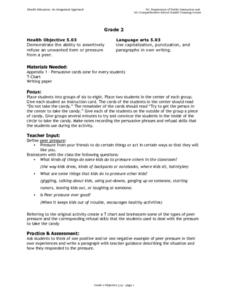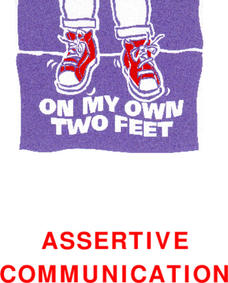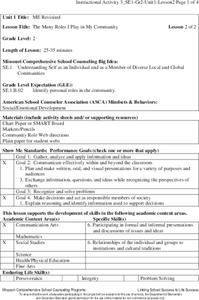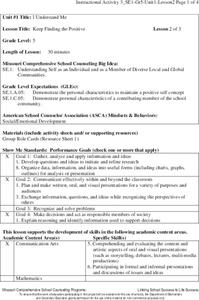Curated OER
Health Education: Germs
Second graders examine germs. In this personal health lesson plan, 2nd graders summarize the methods for preventing the spread of germs through food, water, air, and touch.
Curated OER
Health Education: Body Fluids
Second graders take part in a germ experiment. In this personal health lesson plan, 2nd graders summarize appropriate measures to prevent contact with the body fluids of others.
Curated OER
Health Education: An Integrated Approach
Second graders advocate to others the dangers associated with excessive sun exposure. In this health lesson plan, 2nd graders participate in an experiment in order to identify methods for protecting themselves from the sun.
Curated OER
Health Education: Bullying
Second graders demonstrate steps to take if someone is being bullied. In this health lesson plan, 2nd graders role play situations that call for them to sop bullying behavior. Scripts and tips are included.
Curated OER
Health Education: Tobacco Products
Second graders analyze the dangers of using tobacco products. In this health lesson plan, 2nd graders learn about the dangers of tobacco products as they watch a teacher-led puppet show and sing a new song.
Curated OER
Health Education: Peer Pressure
Second graders examine peer pressure. In this health lesson plan, 2nd graders demonstrate the ability to assertively refuse an unwanted item or pressure from a peer.
Curated OER
Health Education: Self-Control
Third graders identify healthy methods of self-control. In this health lesson plan, 3rd graders take control of their own actions as they take part in a creative activity in which they learn healthy ways to monitor and control themselves.
Curated OER
Health Education: Opinions
Third graders consider the opinions of others. In this personal health lesson plan, 3rd graders demonstrate how to effectively and respectfully express opinions that differ from others as they create and follow rules for productive...
Curated OER
Health Education: An Integrated Approach
Fourth graders participate in role plays in order to consider how they use body language and facial expressions to convey their feelings. In this nonverbal communication lesson plan, 4th graders discuss the importance of paying...
Curated OER
Health Education: An Integrated Approach; A Day Without Sight
Fourth graders hypothesize about the difficulties they may encounter if they did not have their sense of sight, in order to establish a sense of empathy for the disabled. In this lesson on senses, 4th graders record all of the things...
Idaho Coalition
Teen Relationships
Collaborative activities teach adolescents to talk comfortably about teen issues. Class members identify eight factors of healthy relationships among friends, family, and boyfriends/girlfriends. These factors are then used to help...
Missouri Department of Elementary
I’m A Star!
A lesson encourages scholars to be star community members. Pupils take part in a class discussion that challenges them to brainstorm at least two ways to show responsibility within one's community. Small groups play a game in which...
Missouri Department of Elementary
I’m Thumbody!
Positive and negative thinking is the focus of a lesson that boost self-awareness. Beginning with a whole-class discussion, scholars brainstorm what positive thinking looks and sounds like then compares and contrast the two types of...
Department of Education (Ireland)
Assertive Communication
Assertive communication is an acquired skill. Teaching young people to ask for what they need and to believe that they have a right to ask is at the core of a unit on assertive communication. Over the course of the unit, middle and high...
New York State Education Department
TASC Transition Curriculum: Workshop 2
Flipped classrooms and online tools killed the chalkboard! An awesome, hands-on technology workshop asks teachers across all content areas. to examine model lessons, become familiar with research, and explore tech tools they can...
Missouri Department of Elementary
Are You Balanced?
Balance scales create a strong visual of how an individual prioritizes one's self alongside their commitments to the community, school, and home. Scholars complete a graphic organizer then discuss their findings with their peers. A...
George W. Bush Presidential Library and Museum
Teaching Primary and Secondary Sources
What makes a source primary or secondary? Middle schoolers read a definition of each term before exploring different examples and applying their knowledge to a research project.
Missouri Department of Elementary
The Many Roles I Play in My Community
Small groups brainstorm their roles in the community. Then, individually, complete a community roles web worksheet. Peers share their completed product and extend the conversation to include the feelings and character traits that go...
Missouri Department of Elementary
An Apple a Day
Three apples—green, red, and rotten—exemplify character traits, negative and positive. Following a discussion about the classroom community, scholars complete an apple-themed worksheet that challenges them to read each trait, color it...
Missouri Department of Elementary
Fly Your Kite
Encourage scholars to become a productive community member with a kite-themed lesson. Following a review and discussion, learners complete a Venn diagram that displays the connection between character traits needed to make a home and...
Missouri Department of Elementary
What Color is Your Apple?
Build your classroom community with an activity that uses apples to examine oneself and their classmates. Participants draw four large apples on blank paper then exchange them within a small group. Group members write a character trait...
Missouri Department of Elementary
Finding the Positive
To instill the importance of a positive classroom community small groups create a collage out of magazine clippings that highlight three characteristics of self-awareness. Written examples accompany the finished product. Groups turn in...
Missouri Department of Elementary
Keep Finding the Positive
Group members take on roles to create a positive classroom community. Learners perform their role—leader, recorder, presenter, timekeeper, encourager, and collector—in preparation for a formal presentation of their positive thinking...
Virginia Department of Education
States and Forms of Energy
Energy is just energy, right? Explain various forms of energy to your young scientists by using an interactive experiment that contains common objects to demonstrate complex concepts. Pupils conduct experiments for radiant, thermal,...

























